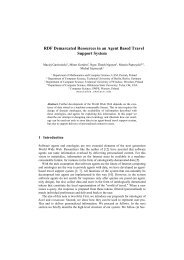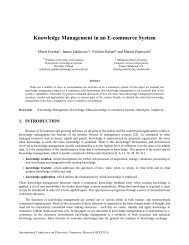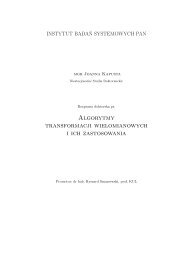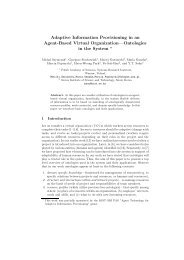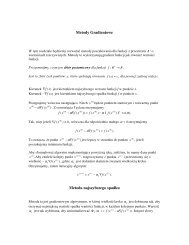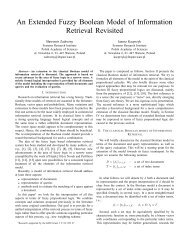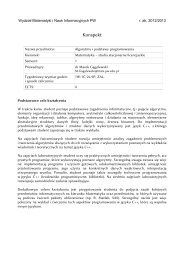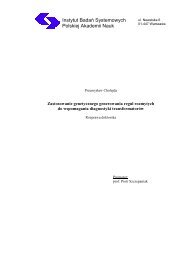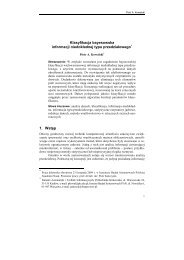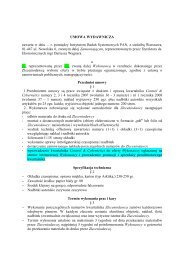Combining Information from Multiple Internet Sources
Combining Information from Multiple Internet Sources
Combining Information from Multiple Internet Sources
You also want an ePaper? Increase the reach of your titles
YUMPU automatically turns print PDFs into web optimized ePapers that Google loves.
5<br />
6<br />
http://www.virtualschool.edu/mon/Economic<br />
s/KOMT.html<br />
http://v1.magicbeandip.com/store/browse_b<br />
ooks_2679_p28<br />
7 http://www.calresco.org/lucas/pmo.htm<br />
8<br />
9<br />
http://home.ubalt.edu/ntsbarsh/Businessstat/stat-data/DsAppendix.htm<br />
http://www.nanyangmba.ntu.edu.sg/subjects<br />
.asp<br />
10 http://www.mises.org/story/2451<br />
# Yahoo Interia<br />
63<br />
http://www.csc.liv.ac.uk/~mjw/pubs/imas/d<br />
istrib/powerpoint-slides/lecture07.ppt<br />
http://www.msu.edu/course/aec/810/studyno<br />
tes.htm<br />
http://www.cs.ucf.edu/~lboloni/Teaching/E<br />
EL6938_2005/slides/MultiAgent.ppt<br />
http://www.lifewithalacrity.com/social_so<br />
ftware/index.html<br />
http://www.lifewithalacrity.com/webtech/i<br />
ndex.html<br />
http://www.marginalrevolution.com/margina<br />
lrevolution/2004/05/<br />
http://www.msu.edu/course/aec/810/studyno http://plato.stanford.edu/entries/Game<br />
1<br />
tes.htm<br />
theory/<br />
http://www.cit.gu.edu.au/~s2130677/teachi http://www.ejournal.unam.mx/cys/vol03-<br />
2<br />
ng/Agents/Workshops/lecture07.pdf 04/CYS03407.pdf<br />
http://home.earthlink.net/~peter.a.taylor http://updatecenter.britannica.com/eb/art<br />
3<br />
/manifes2.htm<br />
iclearticleId=109420&pid=ursd07<br />
http://www.people.hbs.edu/mbazerman/curri<br />
4 http://aufrecht.org/blog/swcat/39172<br />
culum_vitae.html<br />
http://www.concurringopinions.com/archive http://doi.ieeecomputersociety.org/10.110<br />
5<br />
s/economic_analysis_of_law/index.html 9/TSE.2003.1237173<br />
http://dotearth.blogs.nytimes.com/2008/01<br />
/13/a-starting-point-for-productive-<br />
http://wwwstatic.cc.gatech.edu/~jp/Papers/Zagal<br />
et<br />
climate-<br />
discourse/index.htmlex=1357966800&en=2de al - Collaborative Games - Lessons<br />
6<br />
12bb5c6f809de&ei=5088&partner=rssnyt&emc= learned <strong>from</strong> boardgames.pdf<br />
rss<br />
7 http://aws.typepad.com/aws/2005/01/ http://www.kestencgreen.com/kgthesis.pdf<br />
http://www.ferc.gov/legal/maj-ordreg/land-docs/oligoply.pdf<br />
01237173.pdf<br />
http://ieeexplore.ieee.org/iel5/32/27736/<br />
8<br />
http://www.drownout.com/blog/archives/cat http://ieeexplore.ieee.org/iel5/8856/4266<br />
9<br />
_reading_list.html<br />
804/04266807.pdf<br />
http://www.indiana.edu/~workshop/wsl/game<br />
the.htm<br />
Table 4.3.3 Results of Game theory method and search engines for very complex query<br />
10 http://osnews.com/comments/10354<br />
Game theory Ask.com Live Interia Yahoo! Google<br />
Set Coverage 0% 40% 30% 10% 50%<br />
URL to URL 0% 0% 0% 10% 0%<br />
Table 4.3.4 Coverage of Game theory method and search engines for very complex query<br />
From the table above, it can be observed that Game theory method presents higher setcoverage<br />
than the Auction method. Only result set of one search engine is not covered at all, other<br />
result sets 10 top URLs contributed to the final result. Google search engine’s result set is the most<br />
covered of all result sets but with none URL to URL coverage. Ask.com engine’s result set did not<br />
contribute to the final result of this method.<br />
As in the previous cases Game theory returns URLs which are highly ranked by more than<br />
one search engine. That is if there is an URL, which is a part of result sets of more than one engine<br />
and it is contained in the 10 top most URLs, it will be included, with high probability, in the final<br />
result of the Game theory method. Final result also comprises of some URLs that are present in<br />
only one result set. That means that some, more common URLs, where eliminated during the URL<br />
yielding process, because of their low keep payoff. Due to the low keep payoff, the ranks of the<br />
URLs were diminished resulting in those not being taken into account in further process and in turn<br />
in leaving a lot of URLs which were not in the majority of the result sets of the search engines.<br />
Game theory method still does not represent the view of the majority of the search engines.




